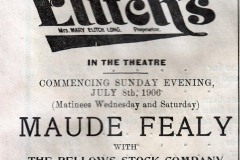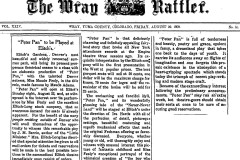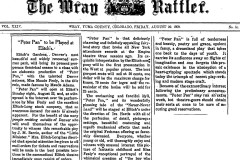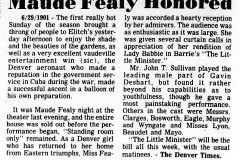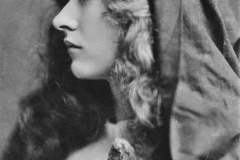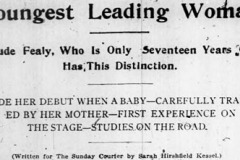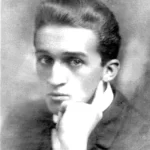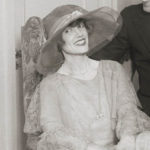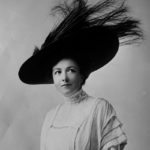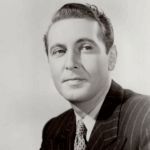Among the names of women who had the greatest impact on the Historic Elitch Theatre — Mary Elitch, Helen Bonfils, and Haila Stoddard — the name Maude Fealy must be included.
Maude’s first appearance on a professional stage was as a young woman at the Historic Elitch Theatre in 1896. Her mother, actress and acting coach Margaret Fealy, was friends with Mary Elitch and both Margaret and Maude would appear in the 1896 season. Her first appearance was during the week of July 19th in Henry Churchill de Mille’s The Lost Paradise.
In 1905, Churchill de Mille’s son, Cecil B. DeMille, was hired as a stock player at Elitch Theatre, and Fealy appeared as the featured actress in several plays. Their friendship continued for decades, including when DeMille cast Fealy in his film The Ten Commandments.
[Borrillo, T. A. (2012). Denver’s historic Elitch Theatre: A nostalgic journey (a history of its times). Colorado. p. 29 & 64-65.]
From the 1901 Buffalo courier:
SIXTEEN years ago a young widow, still in her teens, seeking to procure a living for herself and little babe, and having a leaning towards the footlights, adopted the stage as her profession. Today that young babe, barely 17 years old, has repaid the mother’s labors a thousandfold and is one of the leading stars in one of the best companies in the country.
Long ago, the mother’s struggle, as a struggle for daily bread, ceased; and the height of her ambition was to properly educate and develop her little daughter. The mother, herself but a young woman, is an actress of some note, and was for a number of years leading woman of the Elitch Stook Company in Denver. With a mother’s ready sacrifice, she has given up her professional career, for the time, at least, in order that she may travel with her daughter.
The tenderness and devotion between this mother and child are something beautiful beyond expression. For Miss Maude Fealy is still a child. Her manner, her expression, her conversation constantly remind one of her youthfulness.
Her many complimentary notices and excellent theatrical offers have not turned her head, but have left her an earnest, thoughtful young miss, whose one ambition is to fulfill the expectations of a loving mother and an enthusiastic and admiring public.
In appearance, Miss Fealy is a sweet, winsome maid, tall and slender, whose deep blue eyes have a serious, soulful and, withal, childlike expression. She has an abundance of light hair, which, when I saw her, was in one long braid down her back. She looks even younger than her age, and is so simple and natural that one is unconsciously led to talk of school books and compositions instead of histrionic art.
Miss Fealy does keep up her studies, however, and carries her school books with her. Through her profession, her course in literature is a more thorough and deeper one than many an older student would dare attempt.
In each city where she remains for any length of time, she attends the Berlitz school, studying French. In this way she gets the full benefit of the Berlitz system, which is to study each language under several masters, thereby removing any mannerisms of speech which might be developed by one teacher. Miss Fealy also keeps up her music, and has already arranged for lessons in Philadelphia and Boston, where she plays several weeks’ engagements.
“When I leave Boston,” said Miss Fealy, “I expect to be very wise. I think, then, perhaps, I will be able to lay aside my school books, don’t you? I am a Southern girl, born in Memphis, Tennessee,” she continued as she sat in her room at the Tifft House, showing me a well-filled scrap book of some of her excellent notices and latest pictures.” I like to keep all the critics say about me and my work. They are all very kind. It is a great inspiration to me to feel I must live up to all these good things.” And as I glanced through the book and saw the graceful, beautiful pictures and the exceedingly complimentary notices. I inwardly congratulated the mother who laid as firm a foundation for the character of this talented young miss that it has withstood exceeding praise and great compliment.
“I was born in the South, but most of my life has been spent in Denver,” continued Miss Fealy. “We went there because of the health of my stepfather. It was in Denver. I received much of my theatrical education. My mother had a dramatic school there and be- tween that and my experience in the stock company in which my mother had leading roles, I received my experience.
I really made my professional debut when I was barely three years old. I was the angel in the ascending scene of “Faust.” I played children’s parts until I was 11 years old, spending my last season in these roles with Margaret Mather in a Shakespearean repertoire.
“I then left the stage.” continued this youthful actress, “and went to school in Denver, playing in stock companies during the summer vacation. Walter Clarke Bellows was stage man- ager, and I shall always feel deeply grateful to him for the excellent opportunities he gave me. The first large part I took was Susanne, Miss Maude Adams’ part in “The Masked Ball. For some time I did leading ingenue character. I played Juliet to the Romeo of Miss Blanche Walsh. Through my playing this part. I received a five-years’ contract with Augustin Daly, which was broken by his death. We. mother and I had some trouble after that, for though the managers called me cap- able, they said I was too young. Won’t I be happy when I am twenty-five? You wouldn’t think that youth would be a drawback, would you? I will never forget the afternoon I rehearsed for Mr. Whitney. As I told mother afterwards, it wasn’t inspiration but desperation. I went through Juliet, Pygmalion and several parts and he kept telling me to go on. When I had finished that afternoon, I was almost dead, but he gave me Eunice in ‘Quo Vadis’.”
Miss Fealy achieved great success in this part, and has received a flattering offer from Mr. Whitney to originate the leading role in a new dramatization now being written by Stanislaus Stange, the adapter of “Quo Vadis.” Her excellent interpretation of Alice Faulkner in Mr. Gillette’s “Sherlock Holmes” is still fresh in the minds of our theater goers. Miss Fealy has the promise of a brilliant future and if she retains her physical strength there is no end to that she may achieve.
Though much of the burden of her professional career is lightened by the watchful care of a tender and loving mother, still her slight physique hardly seems strong enough to carry her art. As I was about to leave her, we talked of athletics, and she said she had just planned a regular course of daily exercise. “But I am very wiry.” she added, “and my work never tires me!” All hail to this charming, winsome lass, the youngest leading woman in the country. May success ever attend her!
SARA HIRSHFIELD KESSEL.
Seasons at the Theatre
Elitch Theatre Productions/Roles:
Notable Roles, Awards, and Other Work:
Elitch Theatre Connections:
- In 1905 Fealy appeared at Elitch Theatre with Cecil B. DeMille, who was hired as a stock player for the summer. Their relationship would continue for many years and DeMille would cast Fealy in his future films, including The Ten Commandments.
- Cecil B. DeMille’s film, The Ten Commandments, featured multiple Elitch Theatre alum, including: Edward G. Robinson, Vincent Price, Addison Richards, Douglass Dumbrille, and Maude Fealy.

